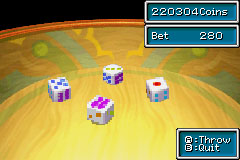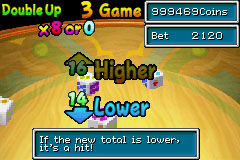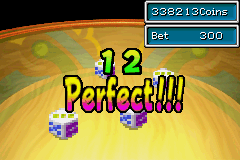Super Lucky Dice

Super Lucky Dice is a gambling mini-game in Golden Sun: The Lost Age, playable in Contigo late in the game. While it is somewhat more complex than the dice game Lucky Dice featured in both this and the previous Golden Sun, it is still quite simple compared to various real-world casino games. Coins are the only commodities bet on and won as prizes.
Rules
The game is shown in The Lost Age making use of an orange wooden table. Put simply, the player throws four dice onto the table in hopes that matching numbers will turn up, and they are then afforded the option to either cash out with their winnings or attempt to double them by betting on whether the next dice throw is either higher or lower.
The moment the A-button is pressed to throw the four dice, the game automatically deducts the listed amount of Coins for your bet. This value is equal to 10 times whichever party member has the lowest level, meaning an endgame-level party with the lowest level being held by someone like a level-52 Ivan will make the base bet 520 coins — even if a party member like Felix would be level 54. If none of the four dice match after this initial throw, you immediately lose your bet and can start the game over again with another instant bet-and-throw.
If two of the dice match, you "win back" your bet (which in casino parlance would be called a "push"), but higher payouts will be earned from the following combinations: Three matching dice will yield twice your bet; two pairs of matching dice will yield thrice your bet; and a rare four-of-a-kind with the dice will yield eight times your bet.
Scoring any of these four positive outcomes will initiate "Double Up mode," in which you have the option of either cashing out your winnings or risking them all on another bet that attempts to multiply them by 2. When you select "Double Up", you are presented two options: "Higher" or "Lower", with the green numbers printed next to them representing numerical thresholds.
For example, if your positive-outcome dice roll initiating this mode included One Pair and had a total value of 15, the "Higher" option will display the number 16; picking this represents you betting on the next dice roll turning out to be "16 or higher". The "Lower" option will display 14, so betting on this means you will either double your earnings from rolling "14 or lower" or lose all your earnings from rolling 15 or higher. Since there is no option for betting on your next dice roll totaling the exact same value as the previous one, there is always a slim chance that you will lose your bet/winnings regardless of whether you pick "Higher" or "Lower".
When you first initiate the Double Up mode by choosing to Double Up, counters at the upper-left corner of the screen will display "1 Game" and "x2 or 0". If you successfully roll for the first Double Up choice and double your winnings, you are given the option to either Double Up or Cash Out, and cashing out will get you both your original bet back and additional coins equal to your bet — but the upper-left will now read "x4 or 0", meaning that choosing to Double Up again can either improve your winnings to x4 of your original bet or take away all your winnings. If you choose to Double Up again, the upper-left will now display "2 Game" as you pick between "Higher" and "Lower".
This procedure can be repeated until the multiplier reads "x32 or 0" and "4 Game"; if you choose to Double Up once more, "4 Game" will now read "Final," and successfully rolling on this will automatically pay out 32 times your original bet. In other words, if you begin a chain with One Pair on the basis of a 300-coin bet derived from a level-30 party member, you can attempt to Double Up 5 times to win back 600, 1200, 2400, 4800, or 9600 coins. Successfully doubling up five times in a row, naturally, takes a great deal of luck, but it results in vastly higher payouts than Lucky Dice.
Higher initiating rolls
The "x# or 0" multiplier is also affected by whether the initiating roll comes out better than a basic One Pair match. If a three-of-a-kind is rolled, for example, the multiplier will start out as "x4 or 0" instead of "x2 or 0", meaning that a basic 300-coin bet — which can already be cashed out for 600 coins right then and there — can be doubled up to winnings of 1200 coins. Doubling it up the full five times can result in a x8 payout of 2400 coins, x16 payout for 4800 coins, x32 payout for 9600 coins, or x64 payout for 19200 coins.
Scoring Two Pairs for the initiating roll will make the multiplier for risking doubling up the first time display "x6 or 0" while letting you cash out what currently amounts to x3 your original bet, so a 300-coin base bet can yield 1800 coins after the first Double Up. The following four Double Up sequences will result in a x12 multiplier for 3600 coins, x24 multiplier for 7200 coins, x48 multiplier for 14400 coins, and x96 multiplier for 28800 coins.
The rarest and most exceedingly profitable scenario occurs if you roll a four-of-a-kind with the starting throw of the dice (which occurs with a probability of 1/216). This will flash the yellow-and-violet letters "Perfect!!!", make your 300-coin bet able to be cashed out as 2400 coins, and make the first Double Up potential multiplier "x16 or 0". The four Double Up stages in this case, starting from a base payout of x16 for 4800 coins, are x32 for 9600 coins, x64 for 19200 coins, x128 for 38400 coins, and x256 for 76800 coins.
Since the highest value possible for the base bet, 990 coins, is reached by having all eight party members at the level cap of 99, the highest theoretical payout for a single round of Super Lucky Dice is 253,440 coins. This is incidentally over ten times the maximum amount of coins you can get from a single throw of the dice in the regular Lucky Dice game.
Ideal plays
Technically, everything happens based on chance that lies almost entirely out of the player's hands despite the illusion of choice the player is granted when they are told to predict whether the next Double Up roll will be either higher or lower than the previous one.
If a successful roll comes out to a total dice value of 13, picking "Lower" for the Double Up phase means betting that the next roll will be anywhere between 4 and 12 inclusive (meaning the nine possible outcomes of 4, 5, 6, 7, 8, 9, 10, 11, and 12). Picking "Higher" means betting on anywhere between 14 and 24 inclusive (meaning the eleven possible outcomes of 14, 15, 16, 17, 18, 19, 20, 21, 22, 23, and 24). Picking "Higher" in this scenario allows for two more positive outcomes of the dice than "Lower", meaning "Higher" would have a higher chance of winning.
Since this game does not include a system often seen in real-life casino games where betting on a less likely outcome gets a higher payout if that bet turns out to be on the mark, there is literally no incentive to pick "Lower" in this case (unless you are playing in an environment like Nintendo Switch Online that allows for reloading save states). As a result, whenever a dice roll's total is 13 or below, you should always pick "Higher", and you should always pick "Lower" when a dice roll's total is 15 or above. If a successful dice roll yielded the exact "middle-of-the-road" value of 14, either Higher or Lower can be picked because both will have the exact same chance to pass or fail. (None of this is to mention, of course, that a chain can haphazardly end at any point by rolling the same dice total two turns in a row, regardless of how high or low that dice total is.)
The most meaningful input available to the player in this game is the decision on whether the most recent dice roll they're Doubling Up from is too close to the center value of 14 for their tastes. The closer the previous dice roll is to either 4 or 24, the likelier it will be that the next roll will be Higher or Lower, respectively, so the player will naturally feel safer doubling up from a number closer to either end of the scale. Thanks to how often the four simultaneously rolled dice will average out their results to somewhere in the 14 range, rolling significantly lower or higher than that central area of the scale makes respectively betting on Higher or Lower a decision that can be made with much greater confidence. In fact, you have a roughly 90% chance to win from picking "Higher" after rolling 9 or picking "Lower" after rolling 19.
The odds in favor of winning upon picking either Higher or Lower, given both the number from which you are doubling up and the chance to lose automatically by rolling the same number as the last round, are listed below:
| Starting Dice Roll |
Pick Higher |
Pick Lower |
|---|---|---|
| 4 | 1295:1 (99.9%) |
0:1296 (0.0%) |
| 5 | 1291:5 (99.6%) |
1:1295 (0.1%) |
| 6 | 1281:15 (98.8%) |
5:1291 (0.4%) |
| 7 | 1261:35 (97.3%) |
15:1281 (1.2%) |
| 8 | 1226:70 (94.6%) |
35:1261 (2.7%) |
| 9 | 1170:126 (90.3%) |
70:1226 (5.4%) |
| 10 | 1090:206 (84.1%) |
126:1170 (9.7%) |
| 11 | 986:310 (76.1%) |
206:1090 (15.9%) |
| 12 | 861:435 (66.4%) |
310:986 (23.9%) |
| 13 | 721:575 (55.6%) |
435:861 (33.6%) |
| 14 | 575:721 (44.4%) |
575:721 (44.4%) |
| 15 | 435:861 (33.6%) |
721:575 (55.6%) |
| 16 | 310:986 (23.9%) |
861:435 (66.4%) |
| 17 | 206:1090 (15.9%) |
986:310 (76.1%) |
| 18 | 126:1170 (9.7%) |
1090:206 (84.1%) |
| 19 | 70:1226 (5.4%) |
1170:126 (90.3%) |
| 20 | 35:1261 (2.7%) |
1226:70 (94.6%) |
| 21 | 15:1281 (1.2%) |
1261:35 (97.3%) |
| 22 | 5:1291 (0.4%) |
1281:15 (98.8%) |
| 23 | 1:1295 (0.1%) |
1291:5 (99.6%) |
| 24 | 0:1296 (0.0%) |
1295:1 (99.9%) |

